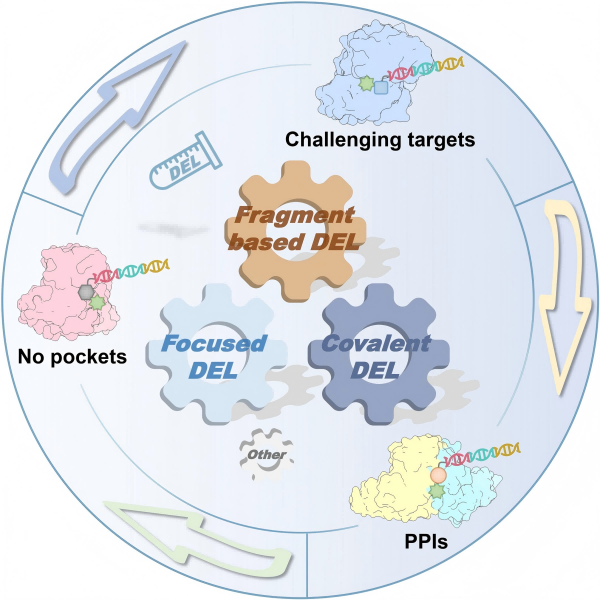Rational Design Strategies in DNA-Encoded Libraries for Drug Discovery
In a study published in Angewandte Chemie International Edition, a research group led by LU Xiaojie from the Shanghai Institute of Materia Medica (SIMM), Chinese Academy of Sciences (CAS), highlights rational construction strategies of DNA-encoded chemical libraries for drug discovery.
Fragment-based DEL strategies introduce minimal structural fragments with broad chemical space coverage into DNA-encoded libraries, allowing small-molecule ligands to efficiently probe multiple binding sub-sites of a target. By employing fragment growing, merging, or linking approaches, researchers can rapidly generate ligands with high affinity and selectivity within the DEL framework. This strategy not only enhances structural diversity during screening but also provides abundant starting points for subsequent structure optimization.
Covalent DELs incorporate electrophilic warheads such as acrylamides or sulfonyl fluorides to enable irreversible covalent modification of specific target residues, particularly cysteines. This approach strengthens binding stability between compounds and proteins, while also capturing transient or low-affinity interactions, thereby broadening the applicability of DEL technology to otherwise “undruggable” targets. The emergence of covalent DELs signifies a conceptual shift in screening—from simply “binding” to effectively “occupying” functional sites.
Focused DEL strategies emphasize the design of targeted sub-libraries around specific protein families, functional domains, or binding motifs. By integrating structural insights, ligand preferences, and biological context, these sub-libraries often deliver higher hit rates and superior hit quality, exemplifying the transition of DEL technology from broad, random exploration to precise and rational targeting.
In summary, DELs are undergoing a pivotal transformation from quantity-driven to quality-driven discovery. The conceptual innovation of library design stands at the heart of this shift. With the continual advancement of fragment-based approaches, covalent targeting, and focused library construction, DELs are poised to unlock greater potential in multi-target drug discovery, intervention of previously intractable proteins, and molecular probe development.
DOI: 10.1002/anie.202511839
Link: https://onlinelibrary.wiley.com/doi/10.1002/anie.202511839
Title: Rational Design Strategies in DNA-Encoded Libraries for Drug Discovery
Key words: DNA-encoded libraries, rational design, drug discovery
Contact:
DIAO Wentong
Shanghai Institute of Materia Medica
E-mail: diaowentong@simm.ac.cn

Fragment-based approaches provide rich starting points for drug optimization. Covalent libraries expand the use of DELs to challenging targets. Focused libraries highlight the move from broad exploration to precise targeting. (Image by WANG Xudong)




